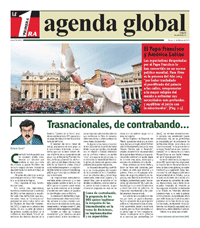Smuggling corporations in…

Popular story has it that a custom officer was obsessed with finding out what the old man was hiding, as he crossed the border every day with a donkey loaded with hay. Never able to discover anything unusual in the forage, one day he announces:
– I have just retired and I have no authority any more, but I will not die in peace if I do not get to know what your business really is.
– It’s easy, -replies the old man- I smuggle donkeys.
With a similar zeal, diplomats, international bureaucrats and NGO activists are scrutinizing every line of the draft that summarizes several months of preparatory “conversations” about what should be the Sustainable Development Goals (SDGs) to be achieved in the coming fifteen years. In 2012, the heads of State and government met in Brazil, in a conference named “Rio +20” as it was held two decades after the historic “Earth Summit.” They agreed on the convenience of having these SDGs and commissioned a working group of thirty countries to define them.
The result of eight meetings of this group is what the draft is about. The document hasn’t got an official UN number yet, nor the signature of the co-chairs of the group, ambassadors Macharia Kamau of Kenya and Csaba Kőrösi of Hungary, but it is available on the website of the United Nations* which means that its official release is imminent.
Intergovernmental negotiations will begin once this summary is published and while they can change the text, it is very difficult for new issues to be included if they are not in the draft. Discussions will be arduous around those points that are incorporated but already identified as conflictive.
The eradication of hunger and extreme poverty are obviously included, as well as universal access to basic health, education, water, sanitation and “modern energy,” to the satisfaction of the respective campaigns.
There is also mention of “sustainable cities” and “sexual and reproductive rights”, but in both cases discordant opinions are recorded, anticipating lack of consensus on the substance of those issues or on their relevance as development goals.
In some key issues, the summary of the co-chairs is particularly shy. Peace, for example, is treated only in relation to States weakened by internal conflicts and the word “crisis” is absent from the document. Global financial instability is not mentioned and debt only appears as a problem for the poorest countries.
The search for what is included and what is missing on the thirty pages of the draft of the co-chairs will intensify in the coming days and corrections may still be included in the current draft, but in delving into these details we should not, like the customs officer, lose sight of the essential: the great innovation proposed is not in the goals but on who bears the task of achieving them.
In the Millennium Development Goals, which expire in 2015, the eighth goal, called for a Global Partnership for Development and clearly described the responsibility of developed countries to contribute with aid, fairer trade rules, technologies, and a solution to the external debt problems.
These promises were not dated and are far from being fulfilled, but at least you know what to claim and from whom. Now, with the systematic addition of a plural and obviating the capital letter this Partnership is transformed into multiple “partnerships” and they are not any more between rich and poor nations but between governments, multilateral agencies and large multinational corporations.
The actors of civil society have certainly a role to play and the expansion of public participation is essential for sustainable development, from the local to the global, but the United Nations is primarily an intergovernmental forum. A pact between governments that might now be replaced by “partnerships” (plural) a term constantly associated in the document with “stakeholders”. In the already existing “partnerships” incubated by the United Nations, Coca Cola is a “stakeholder” in promoting women, MasterCard is a “stakeholder” in education and Morgan-Chase Bank in “energy for all”.
The SDGs could become the smuggler in legitimizing without proper scrutiny the irruption of corporations in global decision-making, implementation and monitoring. These “partnerships” dilute and weaken the responsibility of the states, which are no longer in the center of the action, and they reinforce power asymmetries. Corporations have already acquired through bilateral investment agreements the right to sue states in supranational tribunals (and not through the constitutional justice) and are now candidates to receive official development assistance and sit in the forums where rules are negotiated, at the expense of national (and popular) sovereignty, democracy and human rights.
It is not too late to avoid it.
* http://sustainabledevelopment.un.org/content/documents/3238summaryallowg.pdf
by Roberto Bissio.
English translation of the column published last February 21 by “Agenda Global“, a supplement of La Primera, daily newspaper of Lima, Perú.